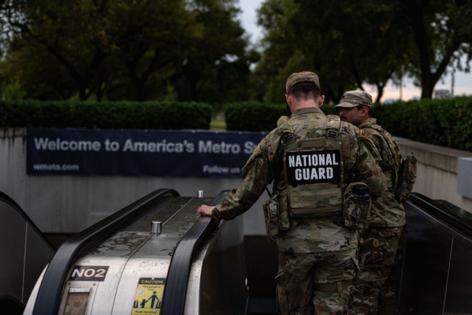Trump use of troops in Washington likely illegal, judge says
Published in News & Features
WASHINGTON — A federal judge ruled that President Donald Trump’s deployment of National Guard troops in Washington, D.C., was likely unlawful in the latest setback to the president’s military mobilizations in Democrat-led cities.
U.S. District Judge Jia Cobb said in a Thursday decision that the deployment of troops irreparably harmed the city’s “exercise of sovereign powers.” But she gave the federal government 21 days to appeal before the order takes effect “to prevent potential disruption to the functioning of the District and the National Guard.”
The ruling comes as the administration is separately engaged in court fights over Trump’s plans to deploy the National Guard in Chicago and Portland, Oregon. The U.S. Supreme Court is weighing whether to let the administration proceed with plans to use troops in Chicago after lower courts blocked the move.
White House spokesperson Abigail Jackson said the lawsuit was nothing more than an attempt to undermine the president’s efforts to stop violent crime in the city.
“President Trump is well within his lawful authority to deploy the National Guard in Washington D.C. to protect federal assets and assist law enforcement with specific tasks,” Jackson said in a statement.
District of Columbia Attorney General Brian Schwalb that the “unprecedented federal overreach is not normal, or legal.”
“Normalizing the use of military troops for domestic law enforcement sets a dangerous precedent, where the president can disregard states’ independence and deploy troops wherever and whenever he wants — with no check on his military power,” Schwalb said in a statement.
The Department of Justice didn’t have an immediate comment on the ruling.
Cobb found that the federal government was likely to lose on both of the central claims raised by city officials. First, she found that the administration lacked authority to use local National Guard to perform “non-military, crime-deterrence missions” without a request from city officials.
‘Distinct’ Authority
“While the Guard’s conduct may be superficially similar when acting in different capacities — the Guard can walk through Union Station in a military procession or as part of a crime-deterring force — the nature of the activity authorized is distinct,” she wrote.
Second, she rejected the government’s arguments that officials had a legal foundation to call in out-of-state troops to assist with the anti-crime mission without a “state-law basis” for it.
More than 2,000 troops have been deployed in the nation’s capital, which overwhelmingly voted against Trump, since August. Schwalb’s office filed a lawsuit in early September, describing the situation as an involuntary “occupation.”
In late October, the administration notified Cobb that the city National Guard’s mission had been extended again through at least February 2026.
Trump and other administration officials have defended the move as necessary for public safety, even as statistics maintained by the city and the Justice Department showed a decrease in crime rates.
The president controls Washington’s National Guard reserve force, setting the city apart from the rest of the country, where state officials exercise authority. But city officials argued that the administration’s use of the local troop’s violated the 19th-century Posse Comitatus Act and other U.S. regulations that generally prohibit the use of active-duty US service members from carrying out domestic law enforcement operations.
The city also protested the use of troops from other states.
The case is District of Columbia v. Trump, 25-cv-3005, US District Court, District of Columbia (Washington, D.C.).
©2025 Bloomberg L.P. Visit bloomberg.com. Distributed by Tribune Content Agency, LLC.







Comments